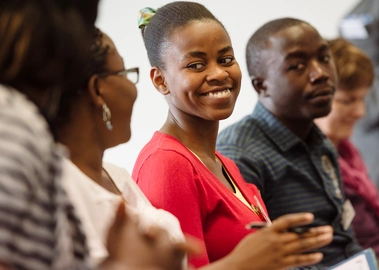The power of PAUWES: first batch of students in Panafrican university program visit Summer School in Germany
July 21, 2015.
<link http: pauwes.univ-tlemcen.dz external link in new>PAUWES’ first batch of students attended workshops and summer school on water, energy and climate change in Cologne and Bonn from July 27-July 31.
International cooperation in higher education: leading German universities welcome African students from the Pan African University for a Summer School
From the 17th to 31st July, the first cohort of students of the Pan African University Institute of Water and Energy Sciences, including Climate Change (PAUWES), attended a Summer School in Germany organized by the Institute for Technology and Resources Management in the Tropics and Subtropics (ITT) at the Cologne University of Applied Sciences, the United Nations University Institute for Environment and Human Security (UNU-EHS), and the Center for Development Research (ZEF) of the University of Bonn in partnership with the Deutsche Gesellschaft fuer Internationale Zusammenarbeit (GIZ) and the German Academic Exchange Service (DAAD).
During these two weeks, the 26 African students were given the opportunity to receive training from highly qualified faculties and had access to the state-of-the-art facilities of the German partner universities. In addition, the students visited significant sites for the water and energy sector, including the Jülich Solar Tower, the Heimbach Hydropower Plant and Cologne Flood Management Center (SteB). Furthermore, the German-Algerian Chamber of Commerce and Industry (AHK Algérie) also organised a range of activities including a visit of Protarget, one of the numerous German companies which are active in the energy and water sectors and are looking to future recruits from the next generation of experts.
For Djamel, 23, from Algeria, this Summer School has been the most rewarding experience of his entire academic journey. “This study trip to Germany exceeded my expectations. The program was very intense but it was worth it. All the professors were very friendly and the workshops, the excursions and lab experiments were really interesting”, said the young Algerian. Djamel is one of the three students staying in Germany after the Summer School as they were offered internship positions at ITT.
“In Africa and in the rest of the world, we can clearly observe the effects of climate change. Replacing fossil fuels by renewable energy is part of the solution. In that respect, Africa has an important role to play as it has significant renewable energy resources. However, in order for the continent to harness its green energy potential, it needs to have highly-qualified young people who have the capacity to use the latest technologies and who share an ambitious vision for their continent. This is the role of PAUWES within the African continent: we are training the next generation of global-minded experts to tackle local and global problems, such as climate change, energy and water supply. It is this constant exchange of people and ideas that makes our Institute so unique on the continent. Of course, this amazing project would not have been possible without the unwavering support of our African and international partners. As Kofi Annan said, ‘cooperation and partnership are the only routes that offer any hope for a better future for all humanity’. At PAUWES, we are fortunate enough to be supported by Germany and Algeria, which are among the most advanced countries in the sectors of renewable energy and water science, as well as climate change,” said Professor Abdellatif Zerga, Director of PAUWES Institute.
Earlier this year, PAUWES held its first International Symposium which was attended by academics and researchers from all over Europe, Africa and beyond. Further activities are already scheduled for the next academic year, including the organization of events (webinars, open lectures, etc.) and the introduction of the social and professional exchange platform. A winter school is even planned in Tlemcen, Algeria, for November.
PAUWES currently has 26 students from 12 African countries studying as part of the first cohort of its MScs in Water and in Energy. These world-class graduate programs, which will from next academic year offer dual tracks in engineering and policy, provide students with a broad foundation in theory and practical skills which equip them to continue to PhD level or pursue a career in water, energy or climate change solutions. The next academic year will start in September 2015 with a new class of 50 students in both the engineering and policy tracks.
About the Pan African University Institute of Water and Energy Sciences
The Pan African University Institute of Water and Energy Sciences (including Climate Change) (PAUWES) is hosted by the University of Tlemcen, Algeria. The institute was founded by the African Union Commission as part of PAU. In partnership with the German government, the Institute offers graduate students access to leading academic research and the latest theoretical and hands-on training in areas vital to the future of African development – water, energy and the challenge of climate change. Supported by the integrated PAU network, which include PAU institutes in Kenya, Nigeria, Cameroon and Southern Africa, PAUWES attracts renowned international faculty and highly qualified students from across the African continent. The German Government (with GIZ, KFW and DAAD) is the Key and Thematic Partner, providing financial, technical and administrative support to the project.
For further information go to: pauwes.univ-tlemcen.dz or follow PAUWES on Twitter <link https: twitter.com pauwes>(@PAUWES) and <link https: www.facebook.com pages pauwes-pau-institute-of-water-and-energy-sciences-incl-climate-change>Facebook.
<link http: www.zef.de external link in new>You can watch photos at ZEF's online photo gallery


